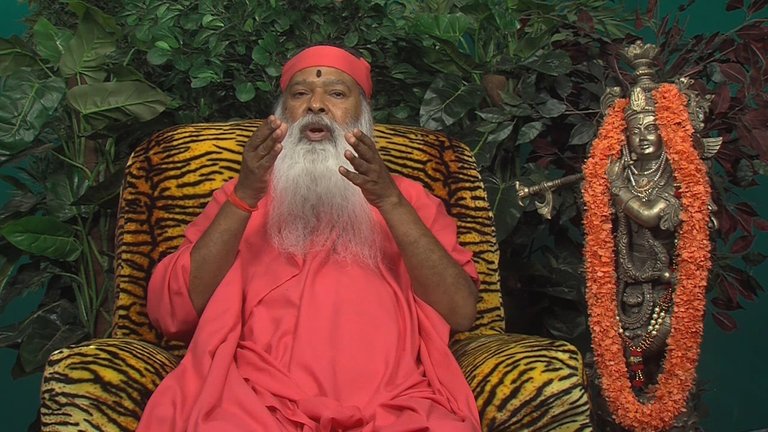Each and every word in Bhagawatam we have to listen attentively. All these are very significant lineages within Bhagawatam. We have to know about these important family trees. Bhagawatam itself is a very vast tree. It contains the lineage of ardent devotees. By listening to this, all forms of difficulties will be washed away. We will achieve sense-control.
Anudinam idam ādareṇa śṛṇvan Pṛthu-caritaṁ prathayan vimukta-saṅgaḥ
Bhagavati bhava-sindhu-pota-pāde sa ca nipuṇāṁ labhate ratiṁ manuṣyaḥ
The spiritual aspirant should discard inclination towards worldly bondages. If he listens to this Prithu’s story daily and explains it to 10 people his devotion towards the Lord will become firm. His devotion will surge. The lotus feet of the Lord are the boat which enable the person to cross this ocean of samsāra. The devotee of the Lord has the ability to acquire everything.
With this the twenty-third chapter of the fourth canto comes to an end.
Fourth Canto Chapter Twenty-four
In this chapter, the birth of Prithus’ grandsons and great-grandsons Prachinabarhi and Pracetās, and the initiation they receive from Rudra is covered.
Maitreya Maharishi continued, “Vijitāśva, who inherited the kingdom from his father Prithu, earned great fame like his father. He became the emperor of the land. He was very affectionate towards his four younger brothers. He established four kingdoms in the four directions and entrusted those responsibilities to his brothers.
His brother Haryakśa was given the eastern direction. Dhumrakeśa was given the southern direction. Vṛka was given the western direction and Dravina the northern direction.
When his father Prithu was performing the Yagna, Indra tried to steal the horse. Vijitāśva witnessed this. However, he did not confront Indra nor did he kill him. Pleased with this Indra blessed him with the mystical power of becoming invisible. He therefore was titled Antardhāna. From wife Shikhanḍini he begot three worthy sons who were revered and respected by one and all.
In the past Maharishi Vashishta had cursed the three fires viz., Pāvaka, Pavamāna and Śuci. These three fires were born as the sons of Vijitāśva. They were situated in the Yogic fire (yogāgni) and through the strength of their Yoga they reached their loka. Antardhāna had another wife Nabhasvati. Through Nabhasvati he had another son Havirdhāna.
It is the duty of the king to levy taxes, punish the wicked or fine them. Antardhāna pondered upon these kingly duties. He concluded that they were cruel. With the excuse that he wants to spend his entire lifetime performing Satra-yāga, he gave up kingly duties and engaged himself in Yagna rituals.
In the process of conducting this Satra-yāga, Antardhāna became inward facing (antarmukha). With absolute concentration of mind, he worshipped the Supreme Lord who could dispel spiritual ignorance and grant Spiritual Knowledge. He obtained Self-realization and finally reached the supreme abode.
Havirdhāna was the son of Antardhāna. From wife Hāvirdhāni he begot six sons viz., Barhiśat, Gayā, Śukla, Krishna, Satya and Jitavrata. Among them Emperor Brahiśat was very powerful. He executed his duties exactly as stipulated by the Vedas. He was an expert in the aśtānga yoga (eight limbs of yoga).
Simultaneously he began innumerable Yagnas in adjacent fire-pits and ensured their smooth conduct. Due to his Yagnas, the entire earth was covered with Kuśa grass (darbha) with east-pointing ends, which are used for Yagna. For this reason, he acquired fame as Prāchinabarhi.
In accordance with Lord Brahma’s command, he married Śatadruti, daughter of the ocean-king. She was an epitome of beauty. At the time of her marriage when she was circumambulating around the fire, Lord Agni, the Lord of fire, was attracted by her beauty. Just as he had lustily desired Śuki in the past, he now desired to possess her.
As the bride was walking, the bells on her anklets melodiously echoed in all the directions. With her anklet bells, she captivated the minds of all Devatas, demons, Gandharvas, Maharishis, Siddhas, humans and Nagās. All of them fell in her sway.
Prācinabarhi begot 10 sons from Śatadruti. They were collectively known as Pracetās. They were steadfast in dharmic austerities and were diligent in execution of their religious activities.
Prāchinabarhi commanded his sons to get married so as to continue the lineage. They decided to obtain the Lord’s grace so that they could properly execute their father’s command. They entered into the ocean and performed penance for 10,000 years.
The Lord is reachable through the means of penance. They meditated upon Srihari, who bestows the fruits for penance. When they left home for penance, Lord Rudra blessed them with his darshan. He taught them the Supreme Truth.
With absolute sense-control, Pracetās meditated upon the Supreme Essence as taught by Lord Rudra and worshipped Srihari” said Maitreya Maharishi.
Each and every word in Bhagawatam we have to listen attentively. All these are very significant lineages within Bhagawatam. We have to know about these important family trees. Bhagawatam itself is a very vast tree. It contains the lineage of ardent devotees. By listening to this, all forms of difficulties will be washed away. We will achieve sense-control.
At this point Vidura got a doubt. When listening to such stories sometimes doubts arise. However the person who listens to entire Bhagawatam or who explains it in detail will be freed from all forms of doubts. Only the Lord’s message will remain imprinted.
Haraye namah.

Om Haraye Namaha !!
JGD Om namo Narayanaya
JGD SGD